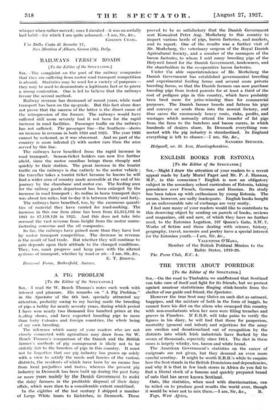RAILWAYS VERSUS ROADS [To the Editor of the SPECTATOR.]
SIR,—The complaint on the part of the railway companies that they are suffering from motor road transport competition is absurd. Statistics may be used for a variety of purposes— they may be used to demonstrate a legitimate fact or to prove a wrong contention. One is led to believe that the railways favour the second method.
Railway revenue has decreased of recent years, while road transport has been on the up-grade. But this fact alone does not prove that the success of the latter is the direct cause of the retrogression of the former. The railways would have suffered still more severely had it not been for the rapid increase in road facilities. Passenger traffic on the railways
has not suffered. The passenger line—the Southern—shows .
an increase in revenue in both 1924 and 1925. The year 1926
cannot be reckoned, as it was abnormal. And no part of the country is more infested (I) with motor cars than the area served by this line.
The railways have benefited from the rapid increase in road transport. Season-ticket holders can now live further afield, since the motor omnibus brings them cheaply and quickly to their station. The great increase in the tourist traffic on the railways is due entirely to the motor vehicle ; the traveller takes a tourist ticket because he knows he will find a wider area of country made accessible at the end of his journey by the charabanc and motor car. The feeding area for the railway goods department has been enlarged by the increase in road transport ; its radius in horse transport days was about ten miles, but to-day it is between thirty and forty.
The railways have benefited, too, by the enormous quanti- ties of material they have carried for road-making. The increase in this one item alone has been from £5,312,193 in 1921 to £7,119,120 in 1925. And this does not take into account the vast revenue from freight from the motor manu- facturing concerns and the oil companies.
So far, the railways have gained more than they have lost by motor transport competition. The decrease in revenue is the result of bad trade. But whether they will continue to gain depends upon their attitude to the changed conditions. They, too, must progress and keep pace with the altered systems of transport, whether by road or air.—I am, Sir, &c., E. T. BROWN. Buncood Farm, Rotherfield, Sussex.


































 Previous page
Previous page